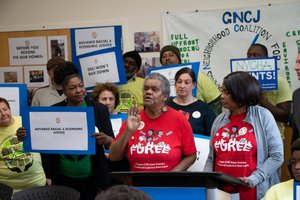A big community win for Gowanus

The Gowanus Neighborhood Coalition for Justice (GNCJ), a diverse group of stakeholders with a mission to elevate the priorities of low- and moderate-income residents, industrial firms, and neighborhood-based organizations and small businesses, is celebrating what they achieved in the recently approved Gowanus rezoning deal. After years of organizing and advocacy, the coalition’s bottom lines—$200 million for the rehabilitation of nearby public housing, preventing additional pollution into the Gowanus Canal, and community oversight to ensure accountability—were met. One of the last major land use initiatives of the DeBlasio administration, the rezoning will pave the way for bringing a substantial new residential population to what was formerly a largely industrial area through the creation of 8,500 new housing units (of which 3,000 will be below market-rate).

Pratt Center has a long history of partnering with Gowanus-based groups concerned with responsible development and environmental justice, and we have been lending technical and planning assistance to them, including GNCJ, over the course of the pre-rezoning planning process. From 2013 to 2015, Pratt Center guided the Bridging Gowanus initiative to generate a public conversation about what a sustainable, livable, and inclusive future for the neighborhood would look like. We designed and facilitated exercises at community meetings to get a broad range of people—from small business owners to low-income residents—talking with each other about challenging trade-offs, such as between more housing density and funding to fix poor housing conditions that are detrimental to the lives of NYCHA residents.
After Mayor de Blasio placed Gowanus on a list of neighborhoods to be rezoned, Pratt Center continued its work in the neighborhood. In spring 2017, we assisted GNCJ with Survive and Thrive: Towards a Justice-Focused Gowanus Neighborhood Plan, a report that expanded on the group’s platform and highlighted its most pressing issues: racial justice, repairs for public housing, environmental injustices related to the Gowanus Canal, and protecting locally-owned small and industrial businesses. We also created and facilitated custom trainings to break down the city’s complex environmental review process so that stakeholders could more effectively make their voices heard in it.

The Gowanus experience provided a window into a broader problem—and opportunity—in the City’s approach to land use changes. Pratt Center used it as a case study of how the City undermines its ability to recover the increased land and real estate values that result from up-zonings. Our report, Our Hidden Treasure: Recovering Land Value to Repair and Rebuild, recommends mechanisms for capturing some of that additional value and redirecting it toward historically marginalized communities that face race- and class-based inequities. They include resturctured taxation at the time of property transfer and requiring property developers to purchase the option to densify.
As we have learned through our work with coalitions in other recently rezoned neighborhoods, these are tough battles where it’s tricky for an equity-oriented community planning process to strike a balance between accepting new development, addressing pre-existing community needs, and preserving neighborhood characteristics that people want to retain. It is critical to build the capacity of coalitions of low-and moderate-income stakeholders to advocate for their priorities in the face of significant development proposals that will majorly impact them. Pratt Center is pleased to have contributed to this important, historic land use victory through our capacity-building efforts and appreciates GNCJ’s trust and partnership.